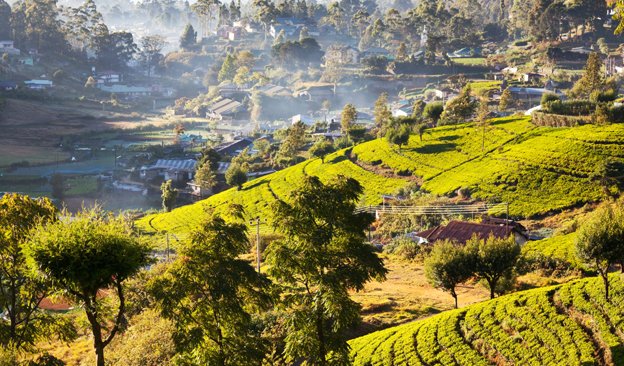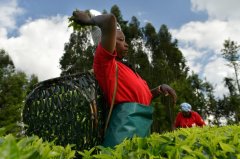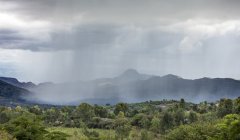Sri Lanka to create the world's cleanest tea Sri Lanka black tea three brands expensive
Sri Lanka government officials have issued a controversial decree essentially cutting off the supply of fertilizers, herbicides and pesticides in an effort to keep local tea intact and profitable. The project is wide-ranging and addresses soil depletion, aging livestock, labour issues, domestic consumption and exports. Fertilizer became a hot spot due to delays in May deliveries to smallholder farmers. Kehel Gunanthna, president of a smallholder association, told the Business Times that it takes five years to transition plants from synthetic to organic fertilizer. He predicted that quality and output would decline, endangering the country's exports. Maintaining high tea exports is critical for Sri Lanka. Sri Lanka has a population of 22 million, and tea production is 100 times more than local consumption. Tea farmers there make up only 5 percent of agricultural workers, but their combined output generates more than $1 billion in foreign exchange annually. Whole leaf tea and crushed leaf tea are the characteristics of Sri Lanka that distinguish it from Kenya and India as commodity producers. Traditional processing takes more time and is more expensive than CTC(cut, tear, roll) processing, but the result is traditional standard quality tea. The problem is that today's consumers want not only the aroma of tea, but also the assurance that tea is sustainable, eco-friendly, light carbon, certified organic, and packaged in an environmentally friendly way. In modern times, no country has attempted to revert to organic farming, but Sri Lanka rightly recognizes that consumers, especially young tea drinkers, prefer it this way. Labour is at the centre of the challenge, as 70 per cent of Sri Lanka's tea is produced by the country's 600,000 smallholder tea farmers. Organic farming is labour-intensive, and while tea brings better prices, much less tea is put on the market. In 2010, Sri Lanka produced 330 million kilograms of tea from 222, 000 hectares of shrubs. Jayampathy Molligoda, current chairman of the Sri Lanka Tea Board, writes that although tea already covers 253,000 hectares of land, about 160,000 tons of fertilizer are still needed annually, and this use will continue in 2020, but with a reduction of 40 million kilograms of fertilizer. He advocated the use of high-tech organic fertilizer production nationwide and pushed for regulations to allow organic fertilizer to be imported. The move is part of a strategic plan to provide Ceylon tea with zero pesticide residues.

Rohan Pethiyagoda, the company's former chairman, said in 2017 that in order to remain competitive,"you have to offer a product that has a character that sets it apart from the competition." We must also consider the needs of the consumer market. Western markets tend to want clean tea with fewer impurities and pesticides; they are also interested in tea ethics, such as fair wages and no child labor." He said the fact that Sri Lanka is the only country in the world that produces black tea that meets all these conditions is significant. In 2019, Sri Lanka banned glyphosate, a herbicide widely used in tea fields. This decision was based on concerns about health problems for smallholders arising from the application of less stringent standards. In rural areas, the number of suicides is disturbing. In the 20 years since 1976, mortality has dropped by 70 percent, but it remains the second most common method, causing 800- 1000 deaths annually. Academic research published in May 2020 concluded that "regulating and replacing" more toxic pesticides with carbosulfan and profenofos significantly reduced self-poisoning. Larger regional growing companies (RPC) experienced fewer incidents. In fact, Sri Lanka was recently nominated for the UN-backed Highly Hazardous Pesticides (HHPs) Control Award. The World Health Organization estimates that in 2016, exposure to hazardous chemicals caused 1.6 million deaths or impaired health. These PRCs are heavily dependent on fertilizer, which has become expensive due to rising oil prices and is in short supply for many reasons related to the outbreak. Sri Lanka's proposal was a landmark. Morley Godard argues that this requires a Green Revolution like the one of the 1950s. "The long-term value created for shareholders depends on the sustainability of the property and the community in which it is located," he wrote. "If property management doesn't think long term, it's unlikely to be consistently profitable." The bigger question, he writes, is,"Are we leaving tea plantations to posterity in better condition than we inherited them?"
Important Notice :
前街咖啡 FrontStreet Coffee has moved to new addredd:
FrontStreet Coffee Address: 315,Donghua East Road,GuangZhou
Tel:020 38364473
- Prev

What are the different characteristics of the four major tea producing areas and representative tea in the world? Which black tea is the most expensive?
Water is the life of mankind. No matter in what form it appears, it is a necessary drink for all living things to survive. Out of this need and the inherent desire for improvement and innovation, humans have come up with a variety of ways to drink water, from flavored soda to coffee. Although they are all based on liquids, they
- Next

Why Indian tea exports first in the world what are the distribution regions and brands of Indian tea?
There was little rain in early spring in Assam and West Bengal, leading to fewer harvesting and factory shutdowns, which are dealing with logistics challenges related to the surge in Covid-19 infection. During the economic slowdown and blockade, many employees were on leave. At the time of this writing, the weather is a greater threat to the tea harvest than Cov.
Related
- Unexpected! Ruixing Telunsu lattes use a smoothie machine to foam milk?!
- % Arabia's first store in Henan opens into the village?! Netizen: Thought it was P's
- Does an authentic standard mocha coffee recipe use chocolate sauce or powder? Mocha Latte/Dirty Coffee/Salty Mocha Coffee Recipe Share!
- What is the difference between Vietnam egg coffee and Norway egg coffee? Hand-brewed single product coffee filter paper filter cloth filter flat solution!
- What is the difference between sun-cured and honey-treated coffee? What are the differences in the flavor characteristics of sun-honey coffee?
- How to make Italian latte! How much milk does a standard latte use/what should the ratio of coffee to milk be?
- How to make butter American/butter latte/butter Dirty coffee? Is hand-brewed coffee good with butter?
- Is Dirty the cold version of Australian White? What is the difference between dirty coffee/decent coffee and Australian white espresso?
- Relationship between brewing time and coffee extraction parameters How to make the brewing time fall to 2 minutes?
- Got entangled?! Lucky opens a new store, Mixue Ice City, and pursues it as a neighbor!

